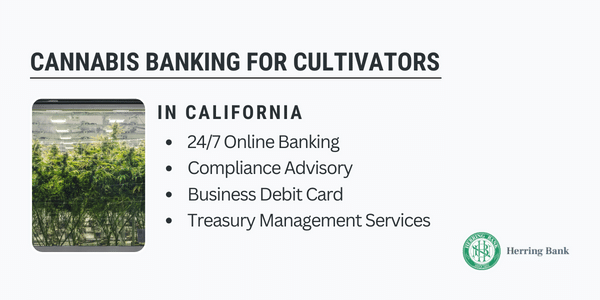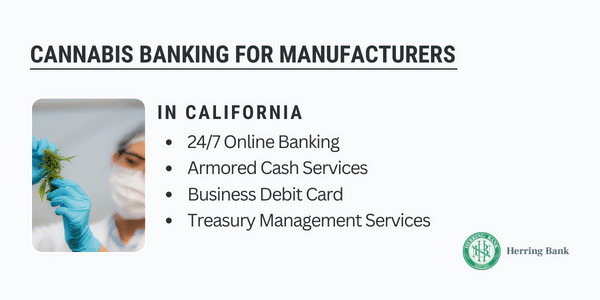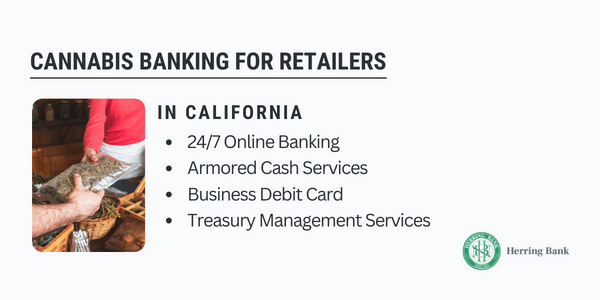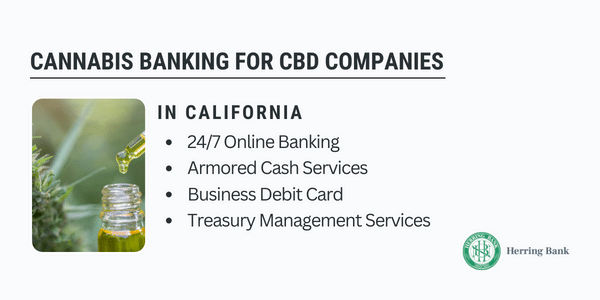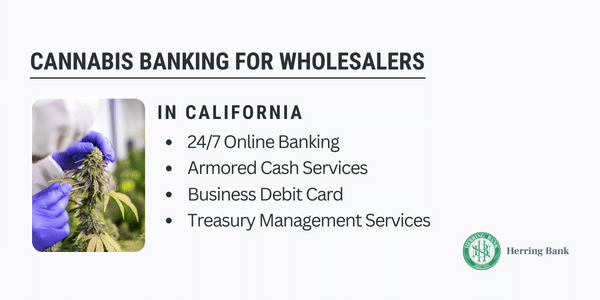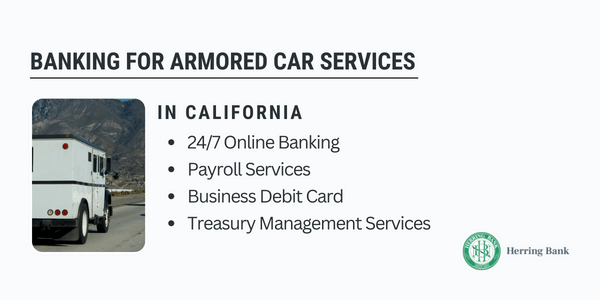California Cannabis Banking Solutions: Secure, Compliant Services for CRBs
Herring Bank – Your Trusted Partner in Navigating Cannabis Finance
As federal cannabis reclassification to Schedule III reshapes the financial landscape, Herring Bank remains California’s leading cannabis-friendly banking partner, offering tailored solutions to empower licensed cannabis businesses. With deep expertise in evolving state and federal regulations, we provide the tools to streamline operations, ensure compliance, and fuel growth in this high-stakes industry.
Why Herring Bank Stands Out in 2025
Regulatory Mastery
Navigate California’s complex cannabis banking terrain with confidence. Our team specializes in:
- SAFE Act compliance (despite federal delays)
- DCC licensing alignment for cultivators, dispensaries, and distributors
Comprehensive Financial Services
- Business Accounts: High-limit checking/savings with 24/7 digital banking
- Cash Solutions: Armored transport, cash pickup/delivery, and deposit automation
- Growth Support: ACH payments, payroll management, and capital access via cannabis-friendly lenders
Addressing 2025’s Biggest Challenges
- Unlicensed Market Pressure
Our cash management systems help legal operators compete by reducing overhead costs by up to 30%. - Local Licensing Delays
Access our pre-licensing financial toolkit—a roadmap for securing permits in restrictive counties like Orange or San Diego. - Tax Burdens
Cannabis CPAs can maximize post-280E deductions and minimize audit risks.
FDIC Insurance
- FDIC-insured accounts
Serving All Major Markets: Los Angeles, San Francisco, Sacramento, San Diego, Fresno & beyond.
Ready to Bank with Confidence?
📞 Call Now: Nationwide +1-877-873-0079 | Local +1-719-470-2340
Marijuana-Friendly Banking in California
Cannabis-friendly banks have emerged as indispensable allies for California’s cannabis-related businesses (CRBs), bridging the gap between federal restrictions and the state’s thriving legal market. These specialized financial institutions, including pioneers like Herring Bank, deliver more than just basic checking and savings accounts—they offer tailored solutions that address the unique operational hurdles faced by CRBs. From digital banking platforms that simplify cash flow management to compliance tools that align with California’s evolving cannabis laws, these banks provide the infrastructure needed to legitimize and scale operations in a high-risk sector.
Beyond foundational services, cannabis-friendly banks like Herring Bank streamline critical financial workflows for CRBs. Secure electronic payment processing, online bill pay/tax payment systems, and direct deposit payroll services minimize cash dependency while ensuring adherence to state and federal reporting standards. This proactive support not only enhances operational efficiency but also fortifies long-term financial stability in an industry where traditional banking remains fraught with barriers.
The influence of these institutions extends far beyond day-to-day banking. By developing cannabis-specific financial products and advocating for fairer federal policies, forward-thinking banks are reshaping the economic landscape of California’s cannabis sector. Their commitment to understanding the industry’s nuances—from seed-to-sale tracking to environmental compliance—fuels innovation and fosters trust. As the market matures, this collaboration between CRBs and cannabis-friendly banks will remain vital to balancing rapid growth with regulatory accountability, ensuring the sector’s legitimacy and sustainability for years to come.

Banking Solutions for California Cannabis Related Businesses
California Cannabis Landscape in 2025: Progress, Challenges, and Innovations
Federal vs. State Dynamics
California remains a trailblazer in cannabis policy, with medical use legal since 1996 and recreational sales operational since 2016. However, federal reclassification of cannabis to Schedule III under the Controlled Substances Act in late 2024 marks a pivotal shift. While this reduces conflicts between state and federal laws, cannabis remains federally illegal, perpetuating challenges for banking, taxation, and interstate commerce. The DEA’s decision reflects growing recognition of medical benefits but stops short of full legalization, leaving financial institutions cautious due to lingering legal risks.
Regulatory Framework and Market Realities
- Licensing and Local Governance
- Businesses must still navigate a dual licensing system (state + local), with municipalities retaining authority to ban retail stores. However, delivery services remain protected statewide, ensuring access even in restrictive areas.
- AB 1775 (effective 2025) authorizes Amsterdam-style cannabis cafes, allowing on-site consumption of cannabis and sale of prepared food, a cultural milestone aligning with California’s progressive ethos.
- Enforcement and Market Challenges
- Unlicensed market dominance: ~75% of sales occur illegally, driven by high taxes (up to 38% for licensed operators) and slow permit approvals.
- State crackdowns: Enhanced enforcement targets illegal growers, with penalties for unlicensed cultivation now including asset forfeiture and felony charges in ecologically sensitive areas.
- Environmental Compliance
- Cultivators must adhere to the California Environmental Quality Act (CEQA), requiring impact assessments for water use, energy consumption, and habitat preservation. Illegal grows in remote regions continue straining water resources, prompting statewide task forces to dismantle operations.
Economic and Social Equity Considerations
- Tax Burden and 280E Relief:
Federal rescheduling allows cannabis businesses to bypass Section 280E, enabling standard business expense deductions—a lifeline for operators previously taxed on gross income. - Social Equity Programs:
Cities like Los Angeles and Oakland enforce equity ordinances (e.g., fee waivers, licensing support) to redress communities impacted by the War on Drugs. However, access to capital remains a barrier for equity applicants.
Cultural Shifts and Consumer Access
- On-Site Consumption and Events:
California now permits cannabis sales at festivals and concerts, with state-approved consumption lounges fostering a normalized cannabis culture. However, only 25% of municipalities allow recreational stores, perpetuating uneven access. - Product Safety:
Mandatory testing for contaminants (e.g., pesticides, molds) in licensed products contrasts sharply with the unregulated market, where 40% of samples show unsafe THC levels or toxins.
Future Outlook
- Banking Innovations:
While the SAFER Banking Act remains stalled, institutions like Herring Bank offer tailored services (e.g., armored cash transport, 24/7 online banking) to mitigate cash dependency. Fintech solutions, including blockchain for transparent transactions, are gaining traction. - Market Consolidation:
Mergers and acquisitions surge as large operators absorb smaller players, driven by rising compliance costs and investor demand for profitability.
Key Legislative Updates for 2025
| Policy Change | Impact |
| Cannabis Cafes (AB 1775) | Allows food sales and live entertainment in licensed lounges, boosting tourism revenue. |
| CEQA Streamlining | Expedited environmental reviews for compliant cultivators to reduce permitting delays. |
| Tax Deductions (Post-280E) | Operators save ~30% in taxes, improving margins for reinvestment. |
Conclusion
California’s cannabis industry in 2025 reflects a maturing yet fragmented market. Federal rescheduling eases financial pressures, while local bans and tax disparities sustain a thriving illicit sector. Innovations in banking, equity programs, and cultural normalization signal progress, but persistent regulatory hurdles and environmental concerns underscore the need for cohesive reform. As the state balances growth with sustainability, collaboration between policymakers, businesses, and communities will determine its trajectory as a global cannabis leader.
For further details on 2025 regulations, visit the Department of Cannabis Control or explore cannabis compliance tools.
Frequently Asked Questions
Can dispensaries use banks?
Yes, dispensaries can use banks like Herring Bank for their financial services, despite the challenges CRBs face in accessing banking services.
What types of cannabis companies do you support?
Herring Bank extends its banking services to a diverse range of cannabis enterprises including Dispensaries, Cultivation operations, Manufacturing firms, Armored Transportation services, among others.
What is the banking Act for cannabis?
The banking Act for cannabis provides “safe harbor” protections to financial institutions, increasing accessibility to banking, lending, and insurance services for the marijuana industry.
What are the benefits of partnering with specialized financial institutions?
Partnering with specialized financial institutions offers cannabis businesses growth opportunities, enhanced banking efficiency, and strong compliance and regulatory support. This can help improve the overall financial management and stability of the business.
What Cities do you serve? Where can cannabis businesses bank in California?
Herring Bank offers Cannabis Banking Services to the following cities: San Jose, Fresno, Sacramento, Long Beach, Bakersfield, Anaheim, Stockton, Riverside, Irvine, Santa Ana, Chula Vista, Fremont, Santa Clarita, San Bernardino, Modesto, Fontana CA. The Bank has developed an extensive network of armored couriers to securely manage cash deposits for cannabis companies.
Ready to discuss how we can help you and your Cannabis Business?
Colorado Cannabis Banking & Armored Courier Services:
Colorado Springs, Denver, Aurora, Pueblo, Arvada
California Cannabis Banking & Armored Courier Services:
Los Angeles, San Diego, San Jose, San Francisco, Fresno, Sacramento, Long Beach, Oakland, Bakersfield, Anaheim, Santa Ana, Riverside, Stockton, Chula Vista, Irvine, Oakland,
We provide Cannabis Banking Nationwide
Alabama, Alaska, Albany, Albuquerque , Anaconda, Billings, Boston, Bozeman, Buffalo, New York City, Detroit, Flagstaff, Grand Rapids, Gulfport, Jacksonville, Jersey City, Las Cruces, Miami, Montana, Newark, Santa Fe, Oklahoma City, Las Vegas NM, Portland, Silver City, Carlsbad, Philadelphia, Phoenix, Scottsdale, Clovis, Orlando, Tulsa, Ann Arbor, Colorado, New Mexico, Michigan, Illinois, Massachusetts, Minnesota, Missouri, Oregon, Virginia, Washington, Nevada, Kentucky, Vermont, Delaware, Espanola, Farmington, Arizona, Arkansas, Baton Rouge, Connecticut, Maryland, Minneapolis, South Dakota

